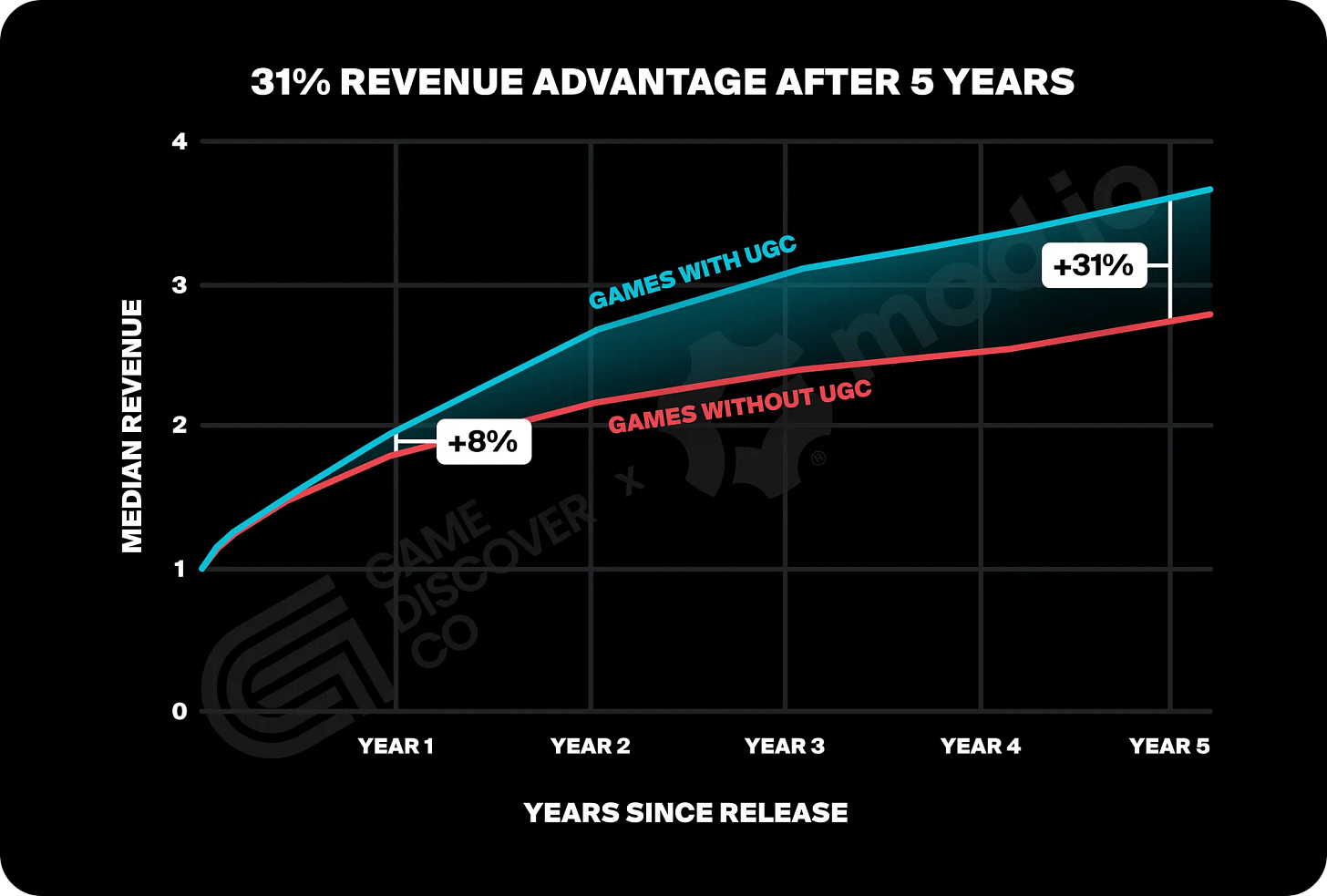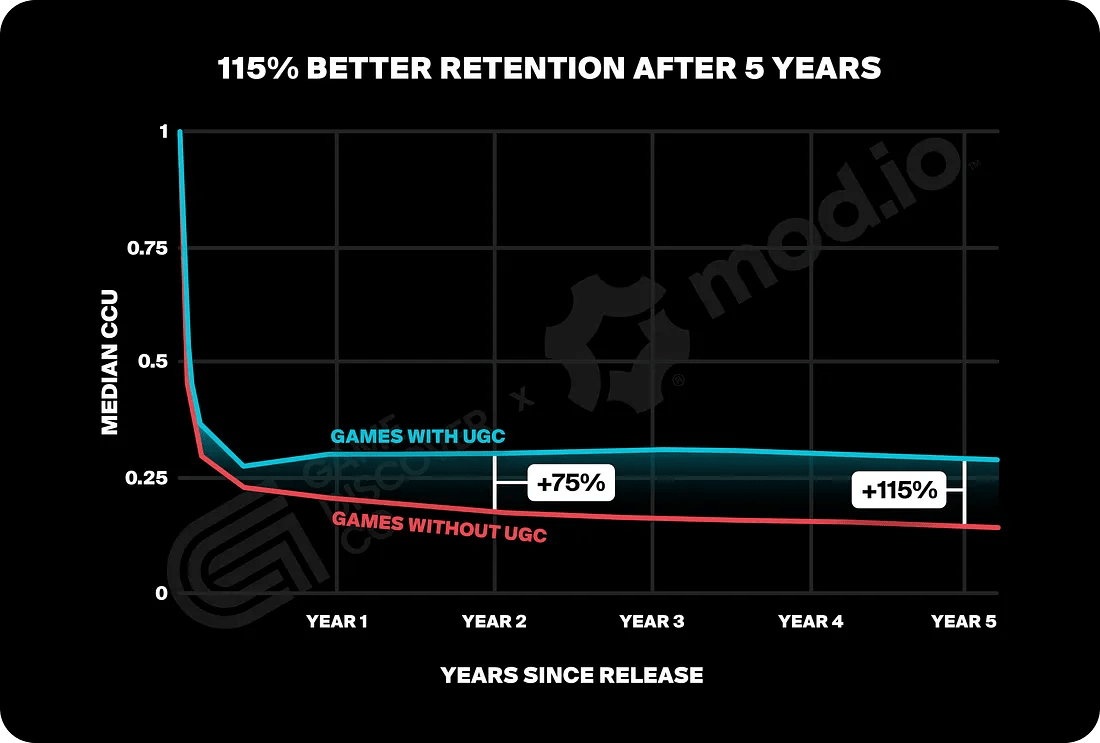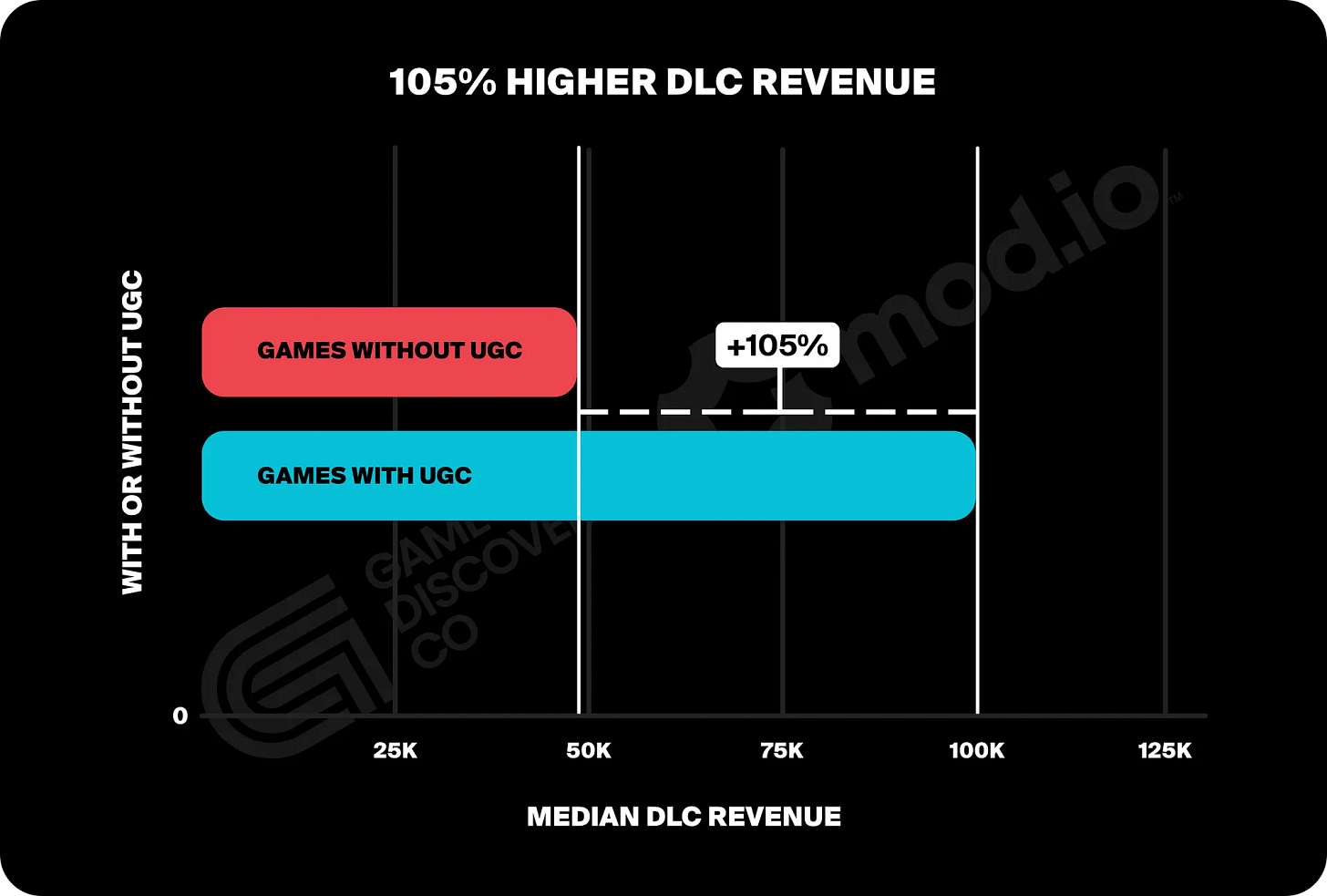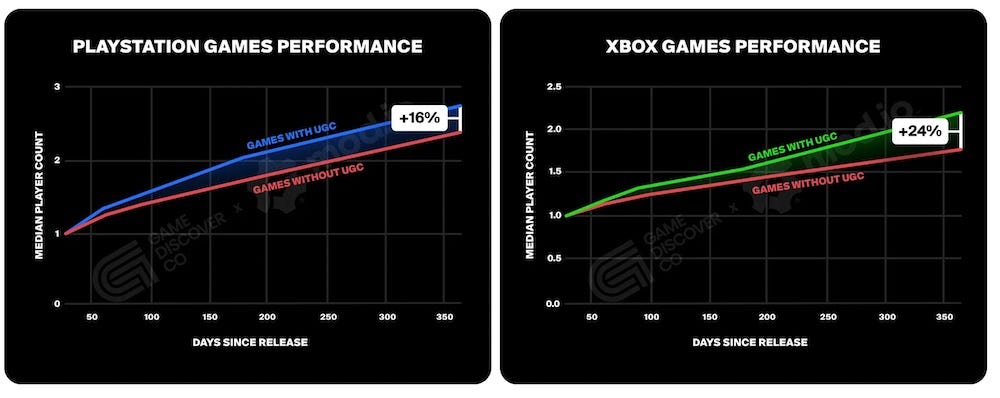Analysis: UGC (still) powers sales & retention
Publikováno: 26.9.2025
With Steam releases & lots of news, too....
[The GameDiscoverCo game discovery newsletter is written by ‘how people find your game’ expert & company founder Simon Carless, and is a regular look at how people discover and buy video games in the 2020s.]
Welcome to the pre-weekend, folks! We’re debuting new UGC research we worked on with the folks from Mod.io today, alongside a link to a piece we wrote on Megabonk that is too big to fit in this overstuffed newsletter, and more besides.
Before we start, we were doing fixes in the GDCo Pro back-end when we spotted EA’s new skateboarding game Skate.had a codename of ‘Dingo’. Is that ‘cos Disney’s Goofy is also known as Dingo in France, and there’s a Goofy/Dingo skateboarding game from 2001? (Probably not - but if that’s wrong, we don’t want to be right, monsieur.)
[WANT LOTS MORE DATA? Companies, get much more ‘Steam deep dive’ & console data SaaS access org-wide via GameDiscoverCo Pro, as 80+ have. And signing up to GDCo Plus gets (like Pro!) the rest of this newsletter and Discord access, plus ‘just’ basic data & more. ]
Game discovery news: Beast, Silent Hill creep up…
So let’s check out the latest game platform & discovery news, straight up, starting with the following:
Over on LinkedIn, we did a whole analysis of Megabonk, the roguelike from ‘vedinad’ that is burning up the Steam charts right now (500k units sold in a week?), including player overlap (Risk Of Rain 2 = 72%, Vampire Survivors = 70%), reportage on why the game’s creator is likely Karlson’s Danidev & more - check it…
The latest Footprints.gg ‘trad media’ mention charts(above, Sept. 17th-23rd) see Borderlands 4 (>3m units sold on PC/console, per us!) still atop the charts, but with Dying Light: The Beast (also a decent performer) and the just-releasing Silent Hill F getting good buzz, too.
Joost van Dreunen has a great overview of the U.S. gov’s H1-B visa changes and the video game companies - from Sony to EA to Roblox - most obviously affected: “Making it more challenging to access international talent will negatively impact the U.S. industry’s ability to compete in a digital entertainment market.”
Steam things: looks like Valve just added an easy-view country/region breakdown for wishlists on your Steamworks wishlist page; the new Steam store menu with “a more dynamic and personalized experience” is now “out of beta and available everywhere - including the Steam client, Steam Deck, and Steam Mobile.”
TOS.gg’s Zach Bussey spotted a gender/age graph from Ipsos Australia which compares social platforms - including Twitch & Discord: “Twitch is the most male-dominated and youngest demographic… Bluesky skews oldest of all the platforms.” (And Discord is skewed younger - and closer to gender-balanced than Twitch.)
Max Power Gaming takes on Roblox smash 99 Nights In The Forest, pointing out “from Sept. 1st–14th, 99 Nights averaged 137M daily visits, compared to 108M for Grow a Garden.” Per MPG, it’s down to “Core game loop: survival built for retention… [while] classes, badges, and weekly updates drive replayability.”
Nintendo things: unexpectedly, Nintendo Of America’s president/COO Doug Bowser is retiring at the end of 2025, with long-time NoA-er Devon Pritchard stepping up (and Satoru Shibata added as CEO); Bloomberg ($) suggests that third-parties mainly aren’t winning on Switch 2 thus far, with inflexibility over physical carts (64GB or key-card) cited as one reason.
Google Play is trying to push from mobile into PC, with the service to run Android games on your computer “officially graduating out of beta to general availability.. we recently added PC-native Mecha Break and mobile hits like Subnautica, Monster Train and Enter the Gungeon.” (Yes, native PC games are also included..)
Game Developers Conference is pushing to ‘festival-ize’ the 2026 event - which makes sense if you know it recently got moved to a parent company division called Informa Festivals. (There’s a Festival Pass which “replaces All Access at a ‘dramatically’ lower price”, and various attempts to revitalize.)
Platform showcases at Tokyo Game Show: PlayStation’s full line-up included a gory gameplay look at Marvel’s Wolverine and Microsoft Flight Simulator coming to PS5 (!) in December; Xbox’s showcase revealed Forza Horizon 6’s Japan setting and 2026 release date, and a bunch of Asia-specific DLC and updates for titles.
An update on Tuesday’s newsletter: just after we published our analysis of Waterpark Simulator, speculating the first-person sim title had already sold >200k Steam units in a month, the creators confirmed it had made it all the way to 250k LTD units sold. (In today’s market, that’s no mean feat.)
Microlinks: Costco has removed the Xbox section from its US and UK websites, and when called, a rep said they won’t be carrying Xbox consoles any more; Qualcomm’s CEO teased his first look at Google’s merger between Android and ChromeOS; Microsoft confirms Forza Horizon 6 won’t come to PS5 at launch.
Exclusive: UGC (still) powers sales & retention…
You may recall that earlier in 2024, GameDiscoverCo partnered with Mod.io (which runs user-generated content (UGC) & mod infrastructure for games like Baldur’s Gate 3 and SnowRunner) to research the performance difference between games that don’t have UGC and those that do, sales and retention-wise.
Now it’s almost a couple of years later, we decided to take a slightly deeper look at it. And you can see the results on Mod.io’s blog(with links to a summary and full report.) But we’d love to briefly round up what we found.
Firstly, we re-ran our Steam analysis - which was previously Steam Workshop-based only, adding newer games & looking at “all games featuring an official UGC or mod support solution, whether it’s Steam Workshop, mod.io, CurseForge, or proprietary solutions such as Bethesda Game Studios Creations, Paradox Mods, or Frontier Workshop.”
Over a five-year period, controlling for games that made >$1 million in Steam revenue in its first month, we tracked revenue for around 1,200 games, of which close to 20% have an official UGC solution. The result (above) is a 8% revenue advantage for UGC-enabled games in the first year, and a 31% advantage after 5 years*.
(*This is slightly improved on the ‘7% in Year 1, 23% by end of Year 5’ that we found in the original survey, probably due to finding more UGC-enabled games & more titles reaching 5-year maturity.)
Our retention numbers, using this same updated set of Steam UGC titles and looking at CCU (concurrents), were also notable. You’ll see Steam games with UGC support displaying 75% better CCU after 2 years of being live, a gap that widens to a 115% difference after 5 years.
There’s some potential correlation-causation issues here - games that allow UGC may be of a genre that naturally has a better ‘long tail’. But UGC for less obvious fits like CRPGs can work - Larian’s Michael Douse told Mod.io that “after implementing official [Baldur’s Gate 3] mod support in 2024, we saw an increase of 20% DAU across all platforms”.
There’s also a concern among devs that allowing (free) UGC might cannibalize existing paid DLC for games. We can’t canonically prove or disprove that, but we did look at total per-DLC revenue for titles with UGC, and found it 105% bigger:
Saber’s Evgenity Sorokin actually told Mod.io that for Snowrunner, “our players using mods proved 2.4 times more likely to buy official DLC.” Again, perhaps a bit chicken and egg-y. But it all seems part of a virtuous ecosystem to us, and players come up with some great ideas for levels, characters, and mods that you would not have thought of…
Next, we tried to look at PlayStation and Xbox data for the first time, using GameDiscoverCo Pro data sets, and discovered that after one year, games with mods available on console (generally via porting of PC-created mods, of course) did show a 16% player advantage (PlayStation) and 24% player advantage (Xbox).
Finally, we examined VR games with over a thousand player ratings on the Meta Quest Store, comparing those with official UGC solutions to those without. Data was limited here, but we estimate that VR games with UGC support had 30% more growth (as a median) over the past year than those without.
Anyhow, thanks to Mod.io for the collab. And as someone who’s seen mountain biking game Descenders flourish through a whole heap of great mods, we don’t underestimate the effect of unleashing players to make cool (or weird, or both!) UGC.





